Films reviewed: Swan Song, Beyond Monet, Respect
Hi, this is Daniel Garber at the Movies for culturalmining.com and CIUT 89.5 FM.
With the end of lockdowns finally reaching Toronto, people are itching to catch up on what they’ve been missing — from getting their hair cut, going to an art gallery, or listening to a concert on the big screen. This week I’m looking at two movies and one experience. There’s soul in Detroit, hairdressing in Ohio, and French impressionism in downtown Toronto.
Wri/Dir: Todd Stephens
Pat Pitsenbarger (Udo Kier) was once known as the Liberace of Sandusky Ohio, known for his gaudy jewelry, his pastel pantsuits and his flamboyant style. The richest women in town flocked to his hair salon where he could accomplish miracles with just his fingertips and a can of hairspray. But now he’s long-forgotten, a penniless old man living in a nursing home with puke-green walls and fluorescent lights. What happened?
His protege Dee Dee (Jennifer Coolidge) opened up a larger salon across the street from his, poaching his longest clients, including Rita Sloan a millionaire and his oldest patron. Then his lover David died of AIDS. And since this was before same-sex marriage, their shared house was inherited by a distant relative, leaving him homeless. So for Pat, Sandusky is just history. Until a lawyer named Mr Shamrock arrives at his room with a new development. Rita has died, and in her will she insists Pat be the one to style her hair in her coffin. And if he does he’ll inherit  25,000 clams. So Pat sets out on a long journey back to long-lost Sandusky, encountering strange people and places along the way. Will he get there in time for Rita’s swan song? And can he finish the job without any beauty supplies?
25,000 clams. So Pat sets out on a long journey back to long-lost Sandusky, encountering strange people and places along the way. Will he get there in time for Rita’s swan song? And can he finish the job without any beauty supplies?
Swan Song is a very gentle, low-key, and slow- moving homage to the gradually fading world of small town gay life in America. Though nostalgic, it doesn’t present a white-washed version. It features Pat (loosely based on a real person) as an inveterate shoplifter, Eunice his best friend who is known for loitering in public toilets, as well as the seedy gay bar where they used to lip-synch torch songs. Udo Kier, the great German actor, has fun with his role, injecting his own trademark campiness. Swan Song is a cute and gentle, (though too slow-moving) LGBT comedy.
Claude Monet was a fin-de-siècle French painter who daubed his canvases with bright spring colours. Critics at the time referred to his work derisively as impressionism, thus providing a name for the movement. But as his fame grew, his eyesight faded, and by the end his works veered to the nearly abstract. Today, though, his paintings of fields, gardens, water and most of all waterlilies are among the most famous of that era. Beyond Monet is an exhibition, not of his art, but rather an immersive experience. His works are projected on a circular, 360 degree wall and ceiling, about the size of a football stadium. The works themselves are constantly rising, falling, or gradually turning around inside the exhibition space, so you can see all of it without moving from your area. It’s constructed around a large wooden cupola in the centre, along with shiny, round landing pads spread all around to sit on. The images are softly animated: waves in his paintings rise and fall; in his winter scenes, snow seems to blow against the landscapes, while flowers and lillies bloom before your eyes. And a constantly-shifting — and at times quite lovely — original soundtrack of music and sound effects (like birds, crickets or waves) adds to the mood.
The exhibition is in three parts. The first consists 0f a few curved wooden bridges and some gossamer sheets hanging from the tall ceilings. It also has a series of bilingual signs explain the art. You pass through a hallway festooned with cheap mylar strips, into the main room where the actual show takes place.
Is seeing an original canvas by Monet the same as a projection, however well-rendered and animated, in a large space? No… not even close. This isn’t art, it’s about art. It reminds me of those parks with miniature versions of the Eiffel tower and the Taj Mahal.
What it is, though, is a pleasantly relaxing experience for those who want to appreciate Monet without the trouble of seeing his actual stuff. Interestingly, the entrance features an assortment of empty wooden canvas frames, to remind us, I suppose, that the real art is still on museum walls. But with the pandemic on, perhaps Beyond Monet is a way to get the feeling of his work without travelling far. And the show is well- ventilated, well-spaced and with a limited number of guests at any one time.
Dir: Liesl Tommy
It’s 1952. 10-year-old Aretha Franklin, known as “Ree”, lives in a middle class Detroit neighbourhood. Her father (Forest Whitaker) is a firebrand baptist preacher with a huge congregation. He is a colleague of the Rev Dr Martin Luther King, who Ree calls Uncle Martin. He holds Saturday night get-togethers where little Ree is the featured performer in a musical household. Still a child, she has the voice of a full-grown woman, and performs be-bop and scat singing, not just gospel. Her father intends to make her a star. By the late 50s he gets Aretha (Jennifer Hudson) signed with John Hammond at Columbia Records where she records old jazz standards with a full orchestra. But without any hits.
Then everything changes in the late 60s when she is taken under the wing of producer Jerry Wexler at Atlantic, the man who coined the term Rhythm and Blues. He introduces her to the back-up players at Muscle Shoals, men who know how to feel the music. Aretha brings in her sisters as back up singers, and  the rest is history. She becomes the queen of soul and her songs internationally famous.
the rest is history. She becomes the queen of soul and her songs internationally famous.
This music biopic follows her career over a 20 year period, from 1952 to 1972. And it’s not a smooth and steady ride. It’s called Respect partly because of her hit single but also to point out the lack of it she experiences from both her domineering father and her tempestuous relationship with the often violent and manipulative Ted (Marlon Wayans) her sometime husband and manager. It also exposes the harsh underbelly of her stable, middle-class life. She is raped at an early age (this is implied not shown) and gives birth to a number of sons while still in her teens (her grandma takes care of them.) Her father says she has “demons” inside, but maybe it’s just her trying to break free, whether through her music or alcoholism, from the relentless disrespect and physical and mental abuse she suffers for much of her young life.
 Respect is part performance, part melodrama, alternating between a near constant flow of music interspersed with re-enactments with her family, business, and love life. We see her ups and downs (mainly her downs), along with many — maybe too many — fights, tantrums and meltdowns. Biopics have two choices: either hire great actors with mediocre or dubbed voices, or great singers. Hudson is the latter. She has a fantastic voice, featured here in so many genres — gospel, jazz, soul and pop — which holds the movie together. The melodramatic scenes are a mixed bag, some very moving, others cringe-worthy. Whitaker is really good as CL Frankin, and Hudson is in nearly every scene. While Respect is not a great movie, I greatly enjoyed watching it.
Respect is part performance, part melodrama, alternating between a near constant flow of music interspersed with re-enactments with her family, business, and love life. We see her ups and downs (mainly her downs), along with many — maybe too many — fights, tantrums and meltdowns. Biopics have two choices: either hire great actors with mediocre or dubbed voices, or great singers. Hudson is the latter. She has a fantastic voice, featured here in so many genres — gospel, jazz, soul and pop — which holds the movie together. The melodramatic scenes are a mixed bag, some very moving, others cringe-worthy. Whitaker is really good as CL Frankin, and Hudson is in nearly every scene. While Respect is not a great movie, I greatly enjoyed watching it.
Look for Swan Song on VOD and digital formats. Respect opens theatrically in Toronto this weekend — check your local listings. And Beyond Monet is exclusively showing at the Metro Toronto Convention Centre now.
This is Daniel Garber at the Movies, each Saturday morning, on CIUT 89.5 FM and on my website, culturalmining.com
Hot Docs 2019! Films reviewed: Bellingcat, The Corporate Coup D’Etat, American Factory, One Child Family
Hi, this is Daniel Garber at the Movies for culturalmining.com and CIUT 89.5 FM.
Toronto’s Hot Docs International Documentary Festival is on now. These films tell us what will be news in a year or two, and goes behind the scenes of stories we only think we know about. Hot Docs is showing hundreds of documentaries from around the world, way more than I could ever talk about, but let me briefly tell you about a few I’ve seen that might interest you.
These capsule reviews are shorter than usual, but hopefully long enough for some of it to sink in. This week I’m exposing you to amateur journalists influencing world politics, multinational corporations taking over governments, foreign-owned factories replacing local ones, and government control reaching into women’s bodies.
 Bellingcat: Truth in a Post-Truth World
Bellingcat: Truth in a Post-Truth World
Dir: Hans Pool
With the explosion of Photoshop, propaganda and fake news, how can we find the real truth? A new news source called Bellingcat offers an alternative. It is similar to Wikileaks but functions as an original news source, rather than a publisher of leaked documents. Founded by Eliot Higgins, a UK “vigilante journalist”, Bellingcat uses Open  Source investigations to determine whether what we see on the news and online is what is really happening.
Source investigations to determine whether what we see on the news and online is what is really happening.
Composed of a network of digital news geeks spread across Europe (all men), Bellingcat’s investigations range from responsibility for the Malaysia Airline plane shot down over the Russia/Ukraine  border, to a look into bombings in Syria, and identifying neo-nazi faces at the Unite The Right rally in Charlottesville. Using an ingenious combination of satellite footage, snapchat images, and uncensored, online discussion groups of soldiers wives, they find convincing evidence that conventional journalists – and government propaganda – ignore. I would have loved to have seen more about Bellingcat’s investgations into malfeasance within its own country – not just about Russians – but their work is fascinating, valuable and so clever.
border, to a look into bombings in Syria, and identifying neo-nazi faces at the Unite The Right rally in Charlottesville. Using an ingenious combination of satellite footage, snapchat images, and uncensored, online discussion groups of soldiers wives, they find convincing evidence that conventional journalists – and government propaganda – ignore. I would have loved to have seen more about Bellingcat’s investgations into malfeasance within its own country – not just about Russians – but their work is fascinating, valuable and so clever.
You can find Bellingcat’s most recent investigations here)
Moving on now from journalism to governments themselves…
Dir: Fred Peabody
Do we still live in democracies, imperfect though they may be? Or has there been a corporate coup d’etat, a virtual takeover of our government? Well this filmmaker says, at least in the United States, the answer is a resounding yes. Widespread incarceration, congressmen and senators with corporate ties, and the phenomenal number of paid lobbyists working in 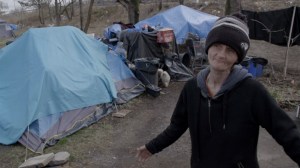 Washington. New laws with extreme libertarian views are often written in total not by politicians but by ALEC a private body associated with the Koch Brothers.
Washington. New laws with extreme libertarian views are often written in total not by politicians but by ALEC a private body associated with the Koch Brothers.
Talking heads include Chris Hedges, Cornel West, Maude Barlow, and John Ralston Saul — who coined the term corporate coup d’etat.
But it also takes us into the heart of the problems by talking with 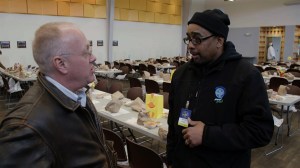 the people of Camden, NJ., a city allowed to decay, and Youngstown Ohio, a former engine of the steel industry, where some people switched their votes from Obama to Trump… not because they love him, but because everyone else had failed to rescue the steel industry, so why not try someone from “outside” the system? This is a great doc, filled both with smart pundits and unknown but unforgettable ordinary people who tell it like it is. Corporate Coup d’état is another politically astute doc from Fred Peabody (whom I interviewed about All Governments Lie in 2016).
the people of Camden, NJ., a city allowed to decay, and Youngstown Ohio, a former engine of the steel industry, where some people switched their votes from Obama to Trump… not because they love him, but because everyone else had failed to rescue the steel industry, so why not try someone from “outside” the system? This is a great doc, filled both with smart pundits and unknown but unforgettable ordinary people who tell it like it is. Corporate Coup d’état is another politically astute doc from Fred Peabody (whom I interviewed about All Governments Lie in 2016).
Youngstown Ohio may look bleak but how are things in Dayton? The next doc looks at both sides of an…
Dir: Steven Bognar, Julia Reichert
Dayton Ohio is the longtime home of Moraine, a major General Motors plant. But when it moved south, the burgeoning middle class started to collapse.
Enter Fuyao Auto Glass, a China-based multinational that manufactures windshields for a large percentage of the  world’s cars. Formerly struggling workers with decades of factory experience are offered a new chance. The only problem is GM payed $29 an hour, Fuyao pays $12. Workers are flown in from China to “train”
world’s cars. Formerly struggling workers with decades of factory experience are offered a new chance. The only problem is GM payed $29 an hour, Fuyao pays $12. Workers are flown in from China to “train”  already skilled labourers in the company’s philosophy. Can formerly unionized factory workers adjust to an autocratic, and some say unsafe,
already skilled labourers in the company’s philosophy. Can formerly unionized factory workers adjust to an autocratic, and some say unsafe, 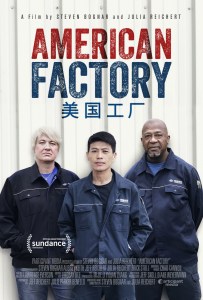 shop? Or will they succeed in unionizing the plant? American Factory is great look at changes in a Midwest factory town. It talks to the people on the shop floor and in their homes. It also follows some American managers visiting the mother plant in China. And it speaks directly both to the American and Chinese workers and management (including the odd, billionaire owner) and the cultural roadblocks they meet on the way. Another great doc from Bognar and Reichert!
shop? Or will they succeed in unionizing the plant? American Factory is great look at changes in a Midwest factory town. It talks to the people on the shop floor and in their homes. It also follows some American managers visiting the mother plant in China. And it speaks directly both to the American and Chinese workers and management (including the odd, billionaire owner) and the cultural roadblocks they meet on the way. Another great doc from Bognar and Reichert!
And finally, a highly personal doc set in China that exposes some dark secrets…
Dir: Nanfu Wang, Jialing Zhang
Nanfu Wang is a young American filmmaker, originally from Jiangxi, a desperately poor, landlocked province in southeast China. She was born in the 1980s right when the One Child Family policy comes into force. (It lasts officially until 2013.) It says city people can only have one child, but peasants can have a  second child if their first one is a girl. Why? It’s simple economics: peasant families depend on their son to stay in the family home and provide for the parents in their old age. Girls move away once they marry.
second child if their first one is a girl. Why? It’s simple economics: peasant families depend on their son to stay in the family home and provide for the parents in their old age. Girls move away once they marry.
But the film shows a dark side of this policy. Wang returns to her home village and finds evidence of parents abandoning  baby girls to die, foetuses scattered in garbage dumps, and a trafficking ring that sold babies to orphanages to be adopted abroad. There are even cases where village chiefs dictated whether pregnant women must abort their foetuses. I don’t know how much of the film applies to a huge country with 1.4 billion people, but what the filmmaker uncovers in her own area really makes one wonder. One Child Nation is a heartfelt but disturbing documentary.
baby girls to die, foetuses scattered in garbage dumps, and a trafficking ring that sold babies to orphanages to be adopted abroad. There are even cases where village chiefs dictated whether pregnant women must abort their foetuses. I don’t know how much of the film applies to a huge country with 1.4 billion people, but what the filmmaker uncovers in her own area really makes one wonder. One Child Nation is a heartfelt but disturbing documentary.
You can catch all of these films — One Child Nation, American Factory, The Corporate Coup D’Etat, Bellingcat: Truth in a Post-Truth World — at Hotdocs over the next ten days. And remember, students and seniors can get in free to daytime screenings!
This is Daniel Garber at the Movies, each Friday morning, on CIUT 89.5 FM and on my website, culturalmining.com.
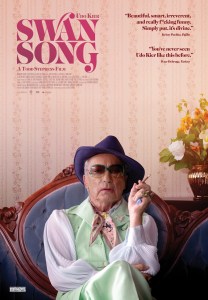

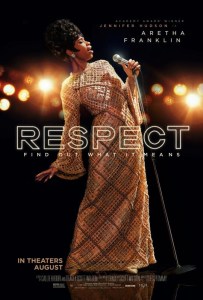



leave a comment